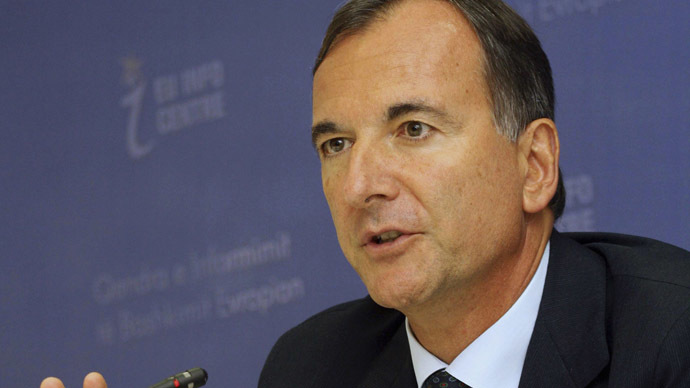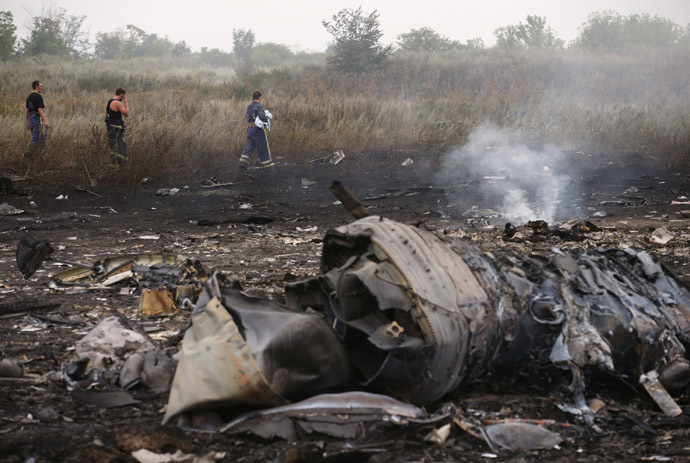EU needs biometrics, fingerprints database to monitor migration – Italian ex-FM
EU member states need to start implementing stronger policies to ensure that “foreign fighters” and refugees remain under observation for the safety of all residents, Former Italian Foreign Minister Franco Frattini told RT.
RT:Open borders within the EU make it
harder to control the influx of refugees from conflict zones -
what can be done to improve control?
Franco Frattini: Well, the problem of the
porosity of European external borders is a real one. When I was
commissioner for justice and home affairs I had proposed to have
a European common register, where, for example, fingerprints,
biometrics – to check and control a bit better all those who
enter European territory. Unfortunately, all the programs to
have, for example, biometric visas and biometric controls are not
yet implemented in full. That said, the problem of refugees is
first of all a human being’s problem, so we cannot refuse to
welcome and to accept those that are coming from conflict
regions. But that said, together with refugees, we are afraid of
the potential infiltrations of so-called foreign fighters.

So there are different problems, but the solution cannot be to
change the current system – to have inside the external borders
an open space which is the Schengen space. The Schengen space has
to be made a bit safer – absolutely true – but not abolished.
RT:Migration isn't spread equally
throughout the EU. Is it fair that migration laws remain EU-wide?
Shouldn't countries that are affected the most be given the right
to introduce their own regulations?
FF: Well I think there is already now the
possibility of random controls of those that are on European
territory. Unfortunately, as I said, they are not yet
implementational measures like largely using biometrics to detect
and to check who is in the part of Italy for example, or France,
and why. Are they entitled to stay? Or not? Thanks to biometrics
and the system of European common register there would be that
possibility. But as I said, member states are still implementing
the final phase to make this system fully operational.
RT:The US openly admits it put pressure on
the EU to impose sanctions against Russia. How great is
Washington's influence?
FF: I know what you know about American pressure
on Europeans. I know in some cases some important top level
officials of US recognize even publicly. I can explain that with
the doubts America had at the very beginning of the readiness of
EU member states to put sanctions, because America knows
perfectly that the first impact of counter-sanctions proposed by
Russia and imposed by Russia is on European business, European
companies – not American companies. So I suppose at the beginning
Americans told that Europeans were reluctant to join them on the
policy of sanctions so they decided to put pressure. But I repeat
I don’t know the details and the inside of that story – I can
just suppose. It was wrong to put pressure on Europeans and it
was wrong for Europeans to decide under pressure, but I don’t
know what happened in reality.
As far as I know, during the Milan talks a few days ago there
were some attempts to ease tensions and how to go towards lifting
sanctions. In my opinion, Europe should seriously reconsider this
policy of sanctions. In my opinion these are not beneficial for
European interests. Much more important would be to deescalate
the tensions and avoid further confrontation with the Russian
Federation. But I’m no longer one of the institutional decision
makers – I would hope that the government of my country would
work towards persuading a number of other European member states
to go back to the policy of cooperation rather than the policy of
confrontation and sanctions.
I think that the best way would be to let the independent
investigation [into the MH17 plane crash] go ahead without
interfering in the independent investigation, or if that German
or American autonomous investigations reached some important
results in terms of evidence, let’s publish data, let’s publish
results. Otherwise, there would be the risk of interfering or
even worse influencing the independent investigation.

I trust the independent investigation, but am very concerned
about the risk of this kind of influences or infiltration into
the independent investigation – this for sure doesn’t help with
finding the truth of what happened. But I don’t know of course
and I suppose that you don’t know either…yet.
I think the international community should urge the authorities
in Kiev to be serious with investigating those that have been
killed – particularly those that have been killed from the army
of Kiev in some regions in the east of Ukraine. Who could be
optimistic in that situation? I am not so optimistic about the
results of this kind of investigation. Also, on debt, a very sad
story of thousands and thousands of victims. We would need an
independent international investigation to be established – this
is not the case yet. I hope that the authorities of Kiev will
accept the idea that international bodies will investigate
together with Kiev authorities on the real fact which led to the
deaths of thousands and thousands of people in eastern Ukraine.












